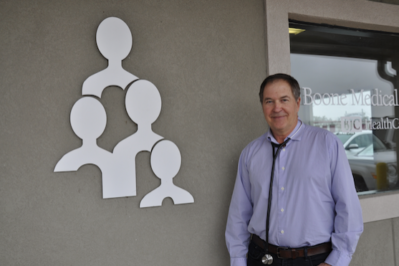
“We have to fix it.”
By Madison Loethen
Nathaniel “Bud” Murphey, MD, of Boone Medical Group Ashland is well known in his community and is loved dearly by his patients. He has practiced medicine for more than 35 years in mid-Missouri and has been in Ashland for over 20 years. While he’s known for caring for the health of many, some may not know that the doctor recently overcame a major health scare himself.
Dr. Murphey has a family history of prostate cancer, so he knew he had an elevated risk of developing the disease. He made sure to get regular prostate-specific antigen (PSA) tests. A PSA test is a blood test that screens for a protein produced by both cancerous and non-cancerous tissue in the prostate. If a patient’s PSA levels are high, prostate cancer could be a reason.
“My tests always came back a little bit high, but then, over a period of six months it increased dramatically, and we knew what the problem probably was,” says Dr. Murphey.
Dr. Murphey was treated at Urology Associates of Central Missouri by Michael Cupp, MD.
“The PSA test, while imperfect, is still our best tool for early prostate cancer detection. Many of the weaknesses of the test are being actively addressed, and we continue to recommend intelligent use of PSA testing,” says Dr. Cupp.
Dr. Murphey underwent biopsies after receiving his results, which confirmed he did have prostate cancer.
“I just thought, ‘Rats. We have to fix it,’” says Dr. Murphey.
He chose to have surgery to treat his cancer, instead of radiation and hormone manipulation therapy.
“I was able to have surgery to cure the cancer, since we found it early and it had not spread,” says Dr. Murphey.
Dr. Murphey had his prostatectomy at Boone Hospital Center. Boone Hospital provides robotic prostatectomies, a minimally invasive treatment that typically results in less blood loss and quicker recovery than traditional surgery.
The surgery was successful and the doctor is back to treating his patients.
“I love my job. I’ve been here so long I know my patients very well. I know their background and often also know their family,” says Dr. Murphey.
Dr. Murphey says he often shares his personal experience about prostate cancer to encourage his patients to get screened.
“It’s their choice, but I know how important it is to catch these things early,” he says.
Dr. Murphey says he lives every day happy to be alive and cancer-free.